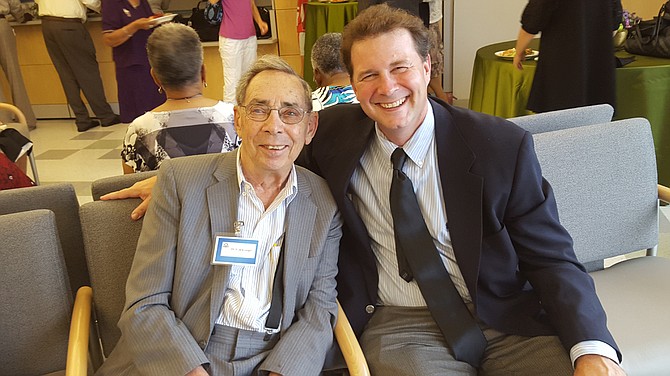As with all of Mississippi, the rural town of Mound Bayou in Bolivar County has its fair share of interesting landmarks, including one that even some residents might not know the history of since its still active to this day.
New York native H. Jack Geiger founded the Delta Health Center, then called the Tufts-Delta Health Center, in 1966 with the help of John Hatch from Tufts University and Andrew James, as well as Mississippians such as Robert Smith, the late Aaron Shirley and L.C. Dorsey. The center also came from the same Office of Economic Opportunity grant that allowed Geiger to found Boston's Geiger-Gibson Community Health Center in 1965, making the DHC the first rural community health center and second community health center in the United States.
For many years, Geiger, Dorsey and Shirley had been collecting boxes of records from the center, recorded interviews and articles, in order to write a book about that largely untold tale from Mississippi's health-care history. However, the pieces didn't come together until Thomas J. Ward Jr., the author of "Black Physicians in the Jim Crow South," agreed to work on the project, resulting in his latest book, "Out in the Rural" (Oxford University Press, $34.95) which hit shelves Dec. 2.
Historian and former Tougaloo College professor John Dittmer, who was Ward's mentor and the author of "Local People: The Struggle for Civil Rights in Mississippi," had been advising Geiger, Dorsey and Shirley on the book for several years. When they decided to look for an author to complete the project, Dittmer recommended Ward.
Ward, an Annapolis, Md., native, became interested in the Mississippi's medical history and its history in general after spending five years in Hattiesburg, where he earned his doctorate in American history from the University of Southern Mississippi in 1999. He was already working on a book on African American prisoners of war when he first met with Geiger but chose to take the project anyway.
"Once I met with him, I knew I wanted to do the story," Ward says. "And I mean, he wanted it done. He's just an unbelievable guy, and the story really is great on a whole bunch of levels. It's about the first rural community health center and, really, the first community health center. The one in Boston opened about a year earlier, but they came out of the same idea, so it was historically significant for that. I mean, there are now over 2,900 community health centers in the United States, and it's the single largest health-care delivery system in the United States."
With Geiger, Dorsey and Shirley having already collected much of the materials, Ward says his task for "Out in the Rural" was to build the narrative and find the logical story at the center, though he says he had to do some research.
For the book, he chose to focus on the period of time from when it received its funding from Tufts in 1965 to when the Delta Health Center board took over the operations in 1972. This allowed him to focus more on the men and women who began the facility and their reasons for doing so.
Ward says the book deals in part with the frustration that Geiger and his colleagues with the Medical Committee for Human Rights felt after seeing the deplorable health conditions in Mississippi during Freedom Summer in 1964. The MCHR came to the state to provide medical aid for civil-rights workers when hospitals refused to treat them, but also found that residents were suffering from malnutrition and other health issues.
Ward says: "These guys were there to patch people up, and they literally sit around one night and say, 'What the hell are we doing? Why are we here for voting rights when people don't have enough to eat, when people don't have basic health care or anything else?'"
The conditions inspired Geiger to found the health centers in Boston and Mound Bayou in the years after.
As Ward worked on "Out in the Rural," he says that he also began to see other layers within the story, including the DHC's significance in the ongoing argument regarding the War on Poverty. For a long time, both the political left and right viewed it as an abject failure, but now, historians can look back on the War on Poverty and are starting to see some elements that had lasting positive effects on the nation.
"There's been a lot of, I guess, dismissing of the success," Ward says. "You know Ronald Reagan's famous line: 'We declared war on poverty, and poverty won.' But that wasn't true. The poverty (rates) halved in less than 10 years, and then the funding was cut out from it, so it's kind of hard to say something wasn't working. I always say it's like giving someone a new car, but you don't give them money for maintenance or gas. You say, 'Well, look. It doesn't work anymore.' But you got 500 miles."
One of the center's greatest legacies, he says, is that it introduced young African American men and women to different career paths than what was previously available to them. For instance, Andy James, who was an environmental engineer and sanitarian, created a program that allowed residents in Bolivar County to become registered sanitarians.
"That's not something an 18-year-old kid thinks about," Ward says. "So the first black sanitarians in Mississippi, the first in the South, came out of this educational program that Andy James developed, and those guys went out and had careers. Many of them came back to Mound Bayou or at least to Mississippi and became leaders in their community."
Thomas J. Ward Jr.'s "Out in the Rural: A Mississippi Health Center & Its War on Poverty" is available now at Lemuria Books. For more information, visit the Oxford University Press website.



Comments
Use the comment form below to begin a discussion about this content.
comments powered by Disqus